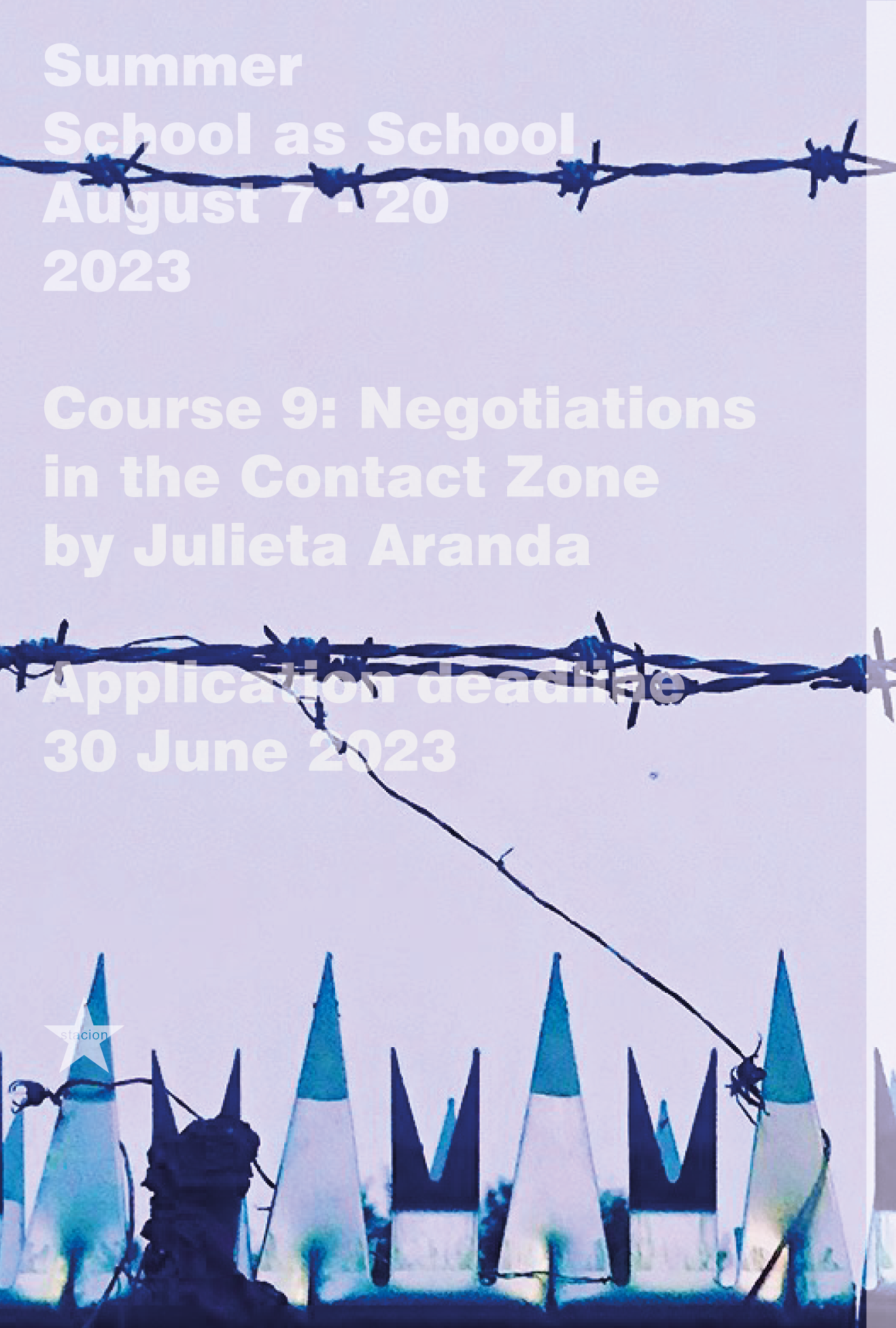
Course 9: Negotiations in the contact zone
Course by Julieta Aranda
14 - 19 August 2023
Course Level BA/MA
2.5 ECTS
Course Description
As defined by Mary Louise Pratt in 1991, “Contact Zones” are social spaces where disparate cultures meet, clash, and grapple with each other, often in contexts of highly asymmetrical relations of power, such as colonialism, slavery, or their aftermaths as they are lived out in many parts of the world today.
The objective of this seminar is to work towards expanding the notion of what Contact Zones are, specially at a historical moment when ecological catastrophes seem to be happening everywhere, and the image of the future becomes more and more uncertain and difficult to delineate.
We will see that Contact Zones are not merely conflict. Contact Zones are patchwork ecologies, uneven conditions of more-than-human livability in landscapes increasingly dominated by industrial forms. In these patchwork ecologies, where there is an intense need to maintain heterogeneity, frictions and snags are seen to have generative potential –and this generative potential of friction is something that we want to be paying close attention to. In the Contact Zones, ecological modeling, political economy, and alternative cosmologies are system experiments that should be in friction and rub against each other. The mode in which these systems can best coexist is perhaps not through avoiding frictions and conflicts, but rather by finding ways in which the frictions can be productive… instead of avoiding conflict, we should find better, more generative conflicts, which can actually produce solutions.
In trying to expand the notion of Contact Zones towards a more-than-human definition, we will be looking at viral worlds, since these are one of the best places from where to ask questions about what is “real”.
Biography
In her artistic practice, Julieta Aranda (Mexico City, Mexico) composes sensorial encounters with the nature of time and speculative literature. She observes the altering human-earth relationship through the lens of technology, artificial intelligence, space travel and scientific hypothesis. Working with installation, sculpture, video and print media, she is invested in exploring the potential of science-fiction, alternative economies and the ‘poetics of circulation’. Her projects challenge the boundaries between subject and object while embracing chance encounters, auto-destruction and social processes.
Julieta Aranda‘s solo exhibitions have been held at Galería OMR, Mexico City, Portikus, Frankfurt, Francesco Pantaleone Arte Contemporanea, Palermo, New Museum, NY, Guggenheim Museum, NY, Museo d’Arte Contemporanea Villa Croce, and the Kunstverein Arnsberg amongst others. She has participated in numerous international group exhibitions including Fridericiaum Museum, Kassel, Bildmuseet, Umeå, Martin Gropius Bau, Berlin, Public Art Munich, Witte de With, Rotterdam and the Museum of Contemporary Art, Detroit. Julieta Aranda was part of documenta 13 in Kassel, and of the 10th Momentum Biennale, 12th Istanbul Biennale, VII Havana Biennale, 8th Berlin Biennale; the 56th Venice Biennale, the 2nd Moscow Biennale, the Liverpool Biennial and the 9th Lyon Biennale amongst others; and her work was exhibited in the Latin American pavilion at the 54. Venice Biennale.
As an editor of e-flux journal, and co-director of the online platform e-flux together with Anton Vidokle, Julieta Aranda has developed the projects Global Contemporary Travel, Time/Bank, Pawnshop, Supercommunity, and e-flux video rental, most of which started in the e-flux storefront in New York, and have traveled to many venues worldwide.
Participation
15 participants will be selected to participate in this course. Eligible participants must read the Terms, fill out the application form, upload the required documents and submit the application form. Incomplete applications will not be considered.
The conditions and registration fees
Enrollment fee 1 - 370 euros for self-paying students, with the offer of accommodation in student residences.
Enrollment fee 2 - 570 euros for institutionally sponsored students, with the offer of accommodation in student residences.
Special conditions apply for alumni of the Summer School as School.
Scholarships are available for students from Kosovo.
Payment must be made after successful application.
Late applications may be accepted until July 22, 2023.